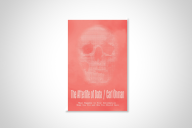You have /5 articles left.
Sign up for a free account or log in.
Someone should reprint C. Wright Mills’s essay "On Intellectual Craftsmanship" as a pamphlet suitable for affordable distribution among people entering a life of scholarship.
That bright idea comes in the wake of an informal colloquy last week about how to survive writing a dissertation. I have no competence to give advice on that score, but do reread Mills every so often, and am always perplexed to find that "On Intellectual Craftsmanship" is not better known. It appears as an appendix to The Sociological Imagination (1959), his eighth book, currently available in a reprint from Oxford University Press.
After the better part of five decades, the book is still quite engaging. Particularly memorable (and also somewhat notorious) is the chapter in which Mills takes long passages from the theoretical work of Talcott Parsons and "translates" them into short paragraphs of slightly platitudinous English. But the satirical moments are almost incidental, for the book is, in some ways, a love letter and a profession of faith. The sociological imagination is "the capacity to range from the most impersonal and remote transformations to the most intimate features of the human self -- and to see the relations between the two." It is, for Mills, an aspect of the humanities, rightly understood.
Mills himself was an iconoclastic figure, and in many ways larger than life. Some of that comes through in a profile that appeared in an alumni magazine for Columbia University, where he taught. "It's a writer's responsibility to orient modern publics to the catastrophic world in which they live," he's quoted as saying. "But he cannot do this if he remains a mere specialist. To do it all, he’s got to do it big!"
In December 1960 -- roughly a year after The Sociological Imagination appeared -- Mills suffered a heart attack while preparing to go on national television to debate American policy toward Cuba. At that point, Mills saw in Castro a figure much like himself: a radical who had little use for the ideological orthodoxies of the Cold War, someone practical-minded but also instinctively defiant. (And Mills loved his Harley-Davidson, so perhaps he and Che discussed motorcycles when they met.)
Once Cuba joined the Soviet bloc, Mills's role as defender of the revolution and critic of American policy became even more lonely and difficult. In March 1962, he suffered another heart attack, this one fatal. He was 45 years old.
A good account of his short but extremely intense life is available in C. Wright Mills: An American Utopian (1983), by Irving Louis Horowitz, who also edited Power, Politics, and People: The Collected Essays of C. Wright Mills (1963). And if you have some demanding task to finish, then by all means be sure to avoid C. Wright Mills: Letters and Autobiographical Writings, a collection prepared by his daughters and published five years ago by the University of California Press. It is a highly charismatic book. Whenever it ends up on my desk, nothing much gets done.
As for The Sociological Imagination, it is not (as you might suspect) a handbook on how to be an academic activist. Nor is it even slightly Marxist -- a label that other people sometimes apply to Mills, though he never accepted it. Once, when an American radical asked him what he believed in, Mills answered: "German motors." In just that spirit, he places a strong emphasis on honoring what he calls "the qualities of the good workman." His language now reads like a sly dig at the upper-middle-class bias in some quarters of academe. If Mills were alive now and wandered into a discussion of academic "professionalization," he would probably make a pest of himself.
While clearly intended for an audience of young sociologists-in-training, almost everything Mills says in "On Intellectual Craftsmanship" applies to work in other disciplines. That's my reason for suggesting it be reprinted for wider circulation. Unfortunately, his language follows the common assumption of the day that scholars will usually be male. But rather than go sic every few sentences, I’ll just quote him and let you make the necessary mental revisions for inclusiveness.
What Mills calls "intellectual craftsmanship" involves more than the ability to produce work that can pass peer review. "Scholarship is a choice of how to live," he writes, "as well as a choice of career." It is (if I may be excused for borrowing another old Greek word) an ethos. That is, a structure of habits that sustains and embodies a quality of mind, a tendency of character.
"Whether he knows it or not," Mills goes on to say, "the intellectual workman forms his own self as he works towards the perfection of his craft." The notion of having a "career" is subordinate to -- even a side-effect of -- this process of inner shaping. "To realize his own potentialities, and any opportunities that come his way," the scholar "constructs a character which has its core the qualities of the good workman."
For Mills, there is a kind of bench where all of this crafting takes place. He calls it "the file." I’m not sure this is the happiest of expressions. It's simple enough, but Mills uses it in his own sense.
For one thing, it includes reading notes and other such documents generated in the course of your research. But the file is also something like a journal. It's where you hammer out the coherence between the different projects that absorb you, and brainstorm new lines of inquiry. "In such a file," Mills writes, "there is joined personal experience and professional activities, studies under way and studies planned." It is where you hash out the complications in any given work-in-progress, and take notes on stray possibilities that might be worth exploring down the line.
One benefit of this is that it can help subdue, or at least reduce, anxiety over writing. (Mills suggests adding something to the file at least once a week.) And it "encourages you to capture 'fringe-thoughts': various ideas which may be by-products of everyday life, snatches of conversation overheard in the street, or, for that matter, dreams. Once noted, these may lead to more systematic thinking, as well as intellectual relevance to more directed experience."
The file is not an excuse for navel-gazing. It is a tool for concentrating your attention to get the most out of your research time. Given how prolific Mills himself actually was, it's clear that he knew what he was talking about.
"One of the things meant by being 'soaked in the literature,'" Mills points out, "is being able to locate the opponents and the friends of every available viewpoint. By the way, it is not well to be too 'soaked in the literature': you may drown in it.... Perhaps the point is to know when you ought to read, and when you ought not to." The ability to recognize that cut-off point is presumably what separates the master craftsman from the apprentice.
"You will have to acquire the habit of taking a large volume of notes from any worthwhile book you read," writes Mills, "although, I have to say, you may get better work out of yourself when you read really bad books."
Apart from taking notes and drafting memoranda-to-yourself, Mills suggests that your files ought to include charts and diagrams. As a sociologist, he was used to presenting some of his findings in that format. But Mills's point is that the intellectual craftsman shouldn't wait until writing for publication to experiment with visual display. Tables, charts, and diagrams "are not only ways to display work already done," he writes; "they are very often genuine tools of production."
His advice is directed at social scientists, but ought to be considered by anyone grappling with complex ideas and large masses of information. Drawing maps or diagrams will, he writes, "enable you to discover the range and full relationships of the very terms with which you are thinking and of the facts with which you are dealing."
The value of such exercises is for the most part heuristic. Which is a refined way of saying that you can afford to be messy and experimental with your sketches. "Most of them flop," writes Mills, "in which case you have still learned something. When they work, they help you think more clearly and write more explicitly."
Mills stresses that any serious practice of intellectual craftsmanship will include learning to communicate your work to other people. There are barriers to such communication, of course. And not all of them are a matter of the complexity of one's ideas. After all, there is an "elaborate vocabulary and involved manner of speaking and writing" through which one signals membership in the guild of scholars.
"It is less difficult to learn this manner than not," he writes in a passage that will probably make some people angry. "It has become a convention -- those who do not use it are subject to moral disapproval. It may be that it is the result of an academic closing of the ranks on the part of the mediocre...."
How, then, to avoid the laziness of self-congratulatory (and often ersatz) "difficulty"? Mills passes along an answer given by his colleague Lionel Trilling, "who has given me permission to pass it on."
A brief interruption here to note the incongruous image that last phrase conjures up. Picture the tweedy, genteel, and proto-neoconservative Trilling in casual conversation with the leather-jacketed Mills -- a lumberjack-like figure, whose highest term of praise for someone was to say, "He's a real Wobbly."
Anyway, to continue...Here is Trilling’s advice, as rendered by Mills – whose every page shows that he took them to heart:
"You are to assume you have been asked to give a lecture on some subject you know well, before an audience of teachers and students from all departments of a leading university, as well as an assortment of interested people from a nearby city. Assume that such an audience is before you and that they have a right to know; assume that you want to let them know. Now write."








